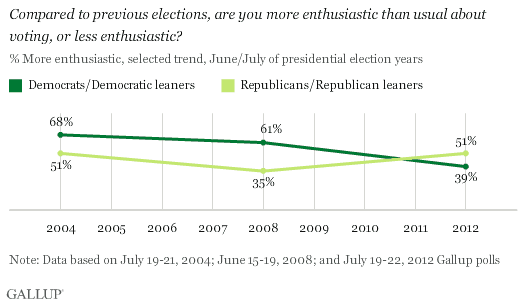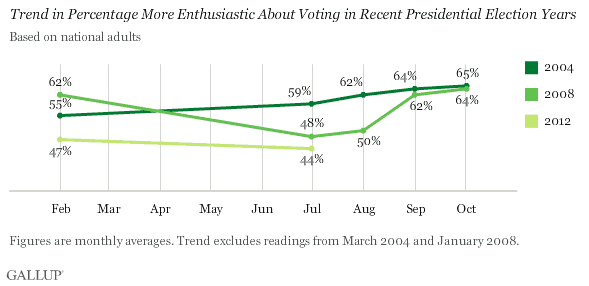PRINCETON, NJ -- Democrats are significantly less likely now (39%) than they were in the summers of 2004 and 2008 to say they are "more enthusiastic about voting than usual" in the coming presidential election. Republicans are more enthusiastic now than in 2008, and the same as in 2004.

These results are based on a July 19-22 USA Today/Gallup poll. They suggest a shift in Republicans' and Democrats' orientation to voting in the coming presidential election compared with the last two, with Republicans expressing more voting enthusiasm. The current 51% to 39% Republican advantage in voter enthusiasm is slightly larger than the 53% to 45% GOP advantage Gallup measured in February of this year.
The voting enthusiasm measure gives a sense of Americans' motivation to turn out and vote but probably also their expectations of their preferred party's chances of winning. Thus, the Republican advantage may indicate a greater likelihood of voting among Republicans but also greater optimism about a Republican victory than was the case in 2008. In turn, Democrats are probably less optimistic about their chances of winning than they were in 2008.
Gallup has found a relationship between voting enthusiasm and the outcome of midterm congressional elections, with the party that has the advantage generally faring better in the elections. That pattern also held in the 2008 presidential election, with Democrats reporting greater enthusiasm throughout the year and Barack Obama winning the election. The 2004 data provided less guidance as to the eventual winner, as the Republicans (68%) and Democrats (67%) had similar scores at the time of the election, which George W. Bush won narrowly.
Voter Enthusiasm Down Among All Americans
Overall, Americans' voting enthusiasm this year has lagged behind what it was in 2004 and 2008. The current level of enthusiasm is down slightly from what it was in the summer of 2008, but that followed a significant drop after the 2008 primaries, from 62% to 48%. Voting enthusiasm began to pick up again in the fall of 2008, and by the time of the 2008 election it was similar to 2004 levels.

The decline in voter enthusiasm this year is consistent with Gallup's finding that self-reported likelihood to vote is lower compared with the fall of 2004 and 2008.
Implications
With voter enthusiasm down significantly from 2004 and 2008 levels, it is reasonable to expect that turnout will be lower this presidential election than in the last two elections, both of which had above-average turnout from a historical perspective.
Republicans' greater enthusiasm about voting is a troubling sign for the Obama campaign, especially given the fact that registered voters are essentially tied in their presidential voting preferences and that Republicans historically vote at higher rates than Democrats do.
However, Democrats' depressed enthusiasm may be influenced by the comparatively tough re-election battle the president is facing, likely due to the state of the economy and Americans' generally sour mood. So it may be that Democrats will still vote in large numbers but are just not as excited about doing so as they were in the last two elections.
Lower Democratic enthusiasm at this point could also indicate that Democrats have not fully tuned in to the campaign, which is possible, given the lack of a Democratic nomination contest this year as there was on the Republican side. If that indeed is a factor, Democrats' enthusiasm may pick up steam in the fall after the Democratic convention. But if Democrats do not close the enthusiasm gap between now and Election Day, it would put Obama's re-election chances in serious jeopardy.
Track every angle of the presidential race on Gallup.com's Election 2012 page.
Survey Methods
Results for this USA Today/Gallup poll are based on telephone interviews conducted July 19-22, 2012, with a random sample of 1,030 adults, aged 18 and older, living in all 50 U.S. states and the District of Columbia.
For results based on the total sample of national adults, one can say with 95% confidence that the maximum margin of sampling error is ±4 percentage points.
For results based on the samples of 500 Republicans and Republican-leaning independents and 449 Democrats and Democratic-leaning independents, the margins of sampling error are ±6 percentage points.
Interviews are conducted with respondents on landline telephones and cellular phones, with interviews conducted in Spanish for respondents who are primarily Spanish-speaking. Each sample includes a minimum quota of 400 cell phone respondents and 600 landline respondents per 1,000 national adults, with additional minimum quotas among landline respondents by region. Landline telephone numbers are chosen at random among listed telephone numbers. Cell phone numbers are selected using random-digit-dial methods. Landline respondents are chosen at random within each household on the basis of which member had the most recent birthday.
Samples are weighted by gender, age, race, Hispanic ethnicity, education, region, adults in the household, and phone status (cell phone only/landline only/both, cell phone mostly, and having an unlisted landline number). Demographic weighting targets are based on the March 2011 Current Population Survey figures for the aged 18 and older non-institutionalized population living in U.S. telephone households. All reported margins of sampling error include the computed design effects for weighting and sample design.
In addition to sampling error, question wording and practical difficulties in conducting surveys can introduce error or bias into the findings of public opinion polls.
View methodology, full question results, and trend data.
For more details on Gallup's polling methodology, visit www.gallup.com.
